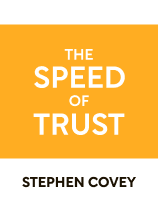

This article is an excerpt from the Shortform book guide to "The Speed of Trust" by Stephen M. R. Covey. Shortform has the world's best summaries and analyses of books you should be reading.
Like this article? Sign up for a free trial here .
How can you understand the psychology of trust in relationships? What should you do to build trust in a relationship?
According to The Speed of Trust author Stephen Covey, the psychology of trust in relationships begins from your very first impression of someone. From there, Covey explains that subsequent interactions either add to or subtract from your relationship’s “trust account.”
Read on to learn Covey’s explanation of the psychology of trust in relationships, including how to earn trust.
Why Trust Matters in Relationships
Trust makes existing relationships more productive and efficient, opens the door to new relationships and opportunities, builds loyalty and respect, and fosters innovation and collaboration. In short, more than any other asset, trust is the key to success.
In The Speed of Trust, Stephen M.R. Covey explains the psychology of trust in relationships and why trust is a game-changer. Covey also lays out a roadmap for building and leveraging trust for success. His experience as the co-founder of the FranklinCovey Global Speed of Trust Practice and CoveyLink, and as the former CEO of The Stephen R. Covey Leadership Center, lends a career-worth of credibility to his arguments. This Washington Post, New York Times, and Wall Street Journal best seller is accessible and actionable enough that readers can start understanding the psychology of trust in relationships and building trust in their own lives today.
Interpersonal Trust Accounts
Considering the psychology of trust in relationships, Covey introduces the idea of trust taxes and trust dividends, which are paid or earned on your results. But Covey also suggests thinking about trust as an “account” in every relationship. Every interaction in a relationship makes either a deposit into or withdrawal from both parties’ accounts. The “balance” in people’s trust accounts sets the tone for their interactions.
| Psychology of Trust in Relationships: Trusting “At First Sight” Research into people’s perceptions of trustworthiness suggests that we start building trust accounts with people at first sight, before any substantive interactions. Certain facial characteristics elicit perceptions of greater trustworthiness, including eyebrows that are high in the middle of the face (think the opposite of the shape of eyebrows in a classic angry scowl), prominent cheekbones, and a wide chin. In addition to faces, our body language can also affect our trust accounts with other people. For example, smiling, leaning in, and making eye contact are all nonverbal ways to build trust, while hiding your hands (for example, in your pockets), shuffling your feet, and fidgeting can make you appear less trustworthy. Covey notes that the same action can lead to different withdrawal amounts for different people. Similarly, different people will be more or less attuned to the facial characteristics and body language referenced above. For example, people with anxiety are likely to take more notice of less trustworthy facial characteristics because they are more highly attuned to possible threats. Likewise, people who have experienced significant breaches of trust in the past may be on high alert for cues that someone isn’t trustworthy. Therefore, as Covey notes, we should never assume to know the account balance in someone else’s trust account with us and should instead focus on making deposits and avoiding withdrawals. |
Principles and Motives
According to Covey, the first two building blocks of trust, your principles and motives, are a function of your nature. Your principles shape how you interpret and respond to your circumstances. For instance, if you hold to the principle of charity, you’ll be a respectful listener even when you find another person’s argument distasteful or misinformed.
Your principles also inform your motives which, in turn, drive your actions. To continue the example, your commitment to the principle of charity means you are genuinely motivated to understand other people’s perspectives, which is why you choose to actively listen instead of interrupting.
| Trusting Nature Over Personality Our personality is defined by the traits we display when interacting with others, such as extroversion and humor. Someone’s personality is relatively easy to observe within just a couple of interactions, and it can be tempting to trust someone when they display personality traits we find attractive. On the other hand, nature (which Covey calls character) can take much longer to gauge. Because people’s natures are based on their beliefs and values, key aspects of nature may only be observable in certain situations. However, since nature remains constant regardless of the situation, it can be a more useful gauge of someone’s trustworthiness than their personality. For an example of the psychology of trust in a relationship, imagine you’re hiring a new salesperson. You might initially gravitate to the confident, engaging applicant over the quiet, serious one. But suppose you had the opportunity to hire both applicants on a month-long trial basis. In that case, you might observe the quiet applicant display remarkable patience and empathy in helping customers or point out an accounting error that would have been an easy opportunity for her to pocket extra cash. Her empathy and honesty in these situations would give you insight into her nature that you couldn’t glean from an interview alone. You might decide to hire the reserved applicant because you’ve had a chance to develop trust in her nature. As the above example highlights, distinguishing between someone’s fundamental nature and personality can be important in deciding who to trust. |

———End of Preview———
Like what you just read? Read the rest of the world's best book summary and analysis of Stephen M. R. Covey's "The Speed of Trust" at Shortform .
Here's what you'll find in our full The Speed of Trust summary :
- Why trust is the ultimate key to success
- A roadmap for building and leveraging trust
- An explanation of Steven Covey's “four cores of credibility”






